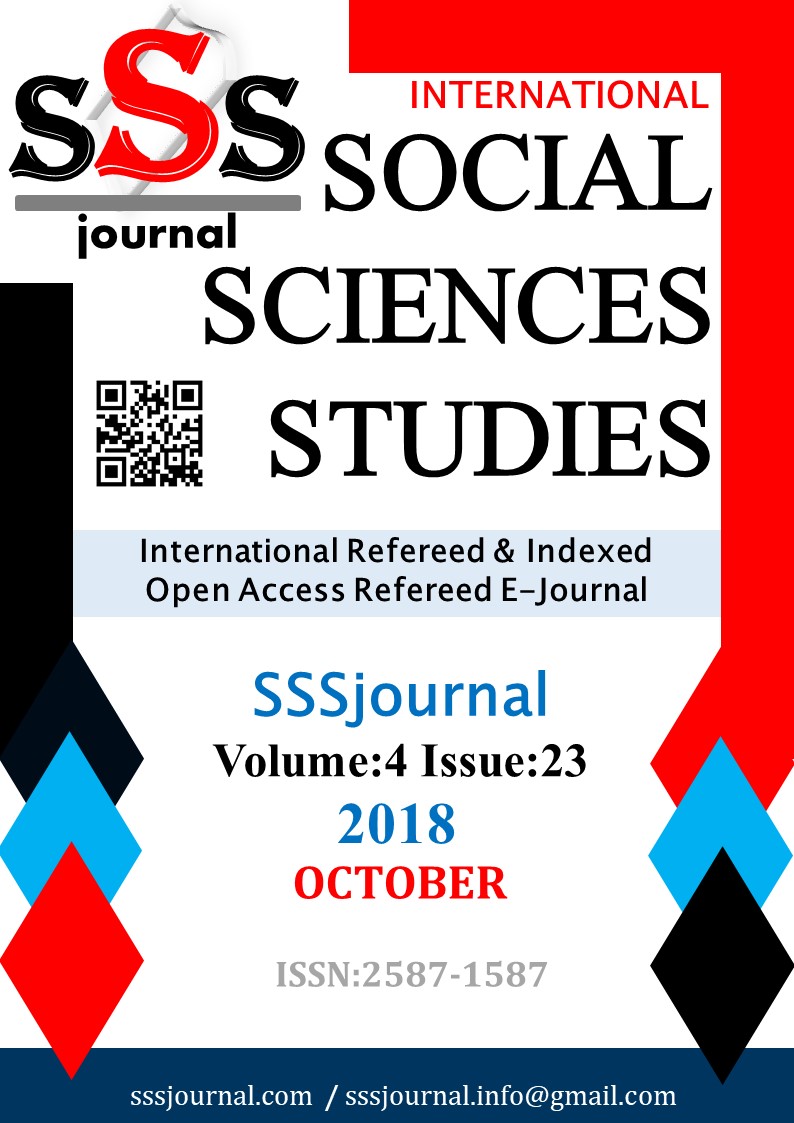Author :
Abstract
Bu araştırmanın kapsamında, kaynaştırma uygulaması yapılan sınıflarda görev yapan öğretmenlerinin sınıf yönetimi boyutları temelinde, sınıf yönetimine ilişkin davranışları analiz edilmiştir. Bu bağlamda sınıf yönetiminin beş temel boyutu değerlendirildiğinde sınıf öğretmenlerinin en sık başvurdukları yöntemler incelenmiş, elde edilen bulgular tartışılıp yorumlanmıştır. Nitel araştırma yöntemlerinden durum çalışması tekniğinin kullanıldığını bu araştırmada veri toplamak amacıyla, araştırmacı tarafından geliştirilen Yarı Yapılandırılmış Görüşme Formu ve katılımcılar için Kişisel Bilgi Formu kullanılmıştır. Araştırmaya katılan öğretmenlerin görüşleri doğrultusunda, sınıfın fiziksel düzenlemesinde en çok dikkat edilen kriterin, öğrencilerin fiziki yapıları olduğu tespit edilmiştir. Diğer yandan, öğretmenler derslere hazırlanırken günlük yaşantıyı bolca kullandıkları, derslerde etkili ve verimli olmak için çeşitli öğretim yöntemleri kullandıkları ancak kaynaştırma öğrencilerine yönelik Bireysel Eğitim planları (BEP) uygulamadıkları sonucuna ulaşılmıştır. Son olarak öğretmenler, sınıf yönetimini bozan problemli davranışlarının asıl kaynağının “öğrencilerin aileleri” olduğunu ve bu problemli davranışlara çözüm için öğrencilerle birebir konuşma yaptıklarını belirtmişlerdir.
Keywords
Abstract
Within the scope of this research, classroom management behaviour of teachers, who are working in inclusion applied classes, are analyzed. The methods that the teachers use the most were found by evaluating the five key dimensions of clasroom management in this context and examined, the findings were discussed and interpreted. In this study, case study method, which is a qualitative research method is used. Semi-Structured Interview Form developed by the researcher and Personal Information Form for the participants were used in order to collect data. In accordance with teachers' opinions who particpated in the survey, it was found that the physical structures of the students is the most important crieterion for physical arrangement of the class. On the other hand, it was discovered that teachers use daily life largely while preparing for the classes, implement different teaching methods in order to be efficient and productive in the classes, but do not implement Individual training plans for inclusive students. Finally, the teachers said that the principal source of problematic behaviors that disrupts the clasroom management is "families of the students" and they make face-to-face conversations with the students in order to solve these probematic behaviours.
Keywords
- Akalın, S. (2015). “Kaynaştırma sınıf öğretmenlerinin sınıf yönetimine ilişkin görüşleri ve gereksinimleri”,
- Akalın, S. (2015). “Kaynaştırma sınıf öğretmenlerinin sınıf yönetimine ilişkin görüşleri ve gereksinimleri”, Ankara Üniversitesi Eğitim Bilimleri Fakültesi Özel Eğitim Dergisi, 16(3):215-234.
- Aydın, A. (2015). Özel Eğitim Sınıflarında Sınıf Yönetimi, Vize Yayıncılık, Ankara.
- Baker, J. A., Clark, T. P., Maier, K. S. and Viger, S. (2008). “The Differential Influence of InstructionalContext on The Academic Engagement of Students With Behavior Problems”, Teaching and Teacher Education, 24(7):1876-1883.
- Başar, H. (2009). Sınıf yönetimi, (15. Baskı), Anı Yayıncılık, Ankara.
- Carpenter, S. L. and McKee-Higgins, E. (1996). Behavior management in inclusive classrooms. Remedial & Special Education, 17(4), 195-199.
- Çelik, V. (2013). Sınıf yönetimi, Anı Yayıncılık, Ankara.
- Çifci, İ., Yıkmış, A. ve Akbaba Altun, S. (2001). “Kaynaştırma Sınıflarında Çalışan ÖğretmenlerinKaynaştırılmış Öğrencilere Yönelik Pekiştireç Kullanma Durumlarının Belirlenmesi”, XI. Ulusal Özel Eğitim Kongresi serbest bildiri, Eğitim Kitapevi Yayınları, Konya.
- Dikici-Sığırtmaç, A. (2010). Okul Öncesinde Özel Eğitim, Kök Yayıncılık, Ankara.
- Erturan, N. (2003). “Özel Gereksinimleri Olan Çocukların Bulunduğu Sınıflarda Ders Ortamlarının Düzenlenmesi”, A. Kulaksızoğlu (Ed.). Farklı Gelişen Çocuklar, Epsilon Yayıncılık, İstanbul.
- Evertson, C. M., Sanford, J. P. and Emmer, E. T. (1981). “Effects of Class Heterogeneity in Junior High School”, American Educational Research Journal, 18(2):219-232.
- Evertson, C.M. and Weinstein, C.S. (2006). “Classroom Management as a Field of Inquiry”, Evertson, C.M.& Weinstein, C.S. (Ed.), Handbook of classroom management: Research, practice and contemporary ıssues, 3–15. Lawrence Erlbaum Associates,inc.
- Greenwood, C. R. (1991). “Longitudinal Analysis Of Time, Engagement And Achievement in atRisk Versus Non-Risk Students”, The Council for Exceptional Children, 57(6):521–535.
- Greenwood, C. R. and Carta, J. J. (1987). “An Ecobehavioral Analysis of İnstruction within Special Education”, Focus on Exceptional Children, 19(9):1-12.
- Greenwood, C. R., Horton, B. T. and Utley, C. A. (2002). “Academic Engagement: Current Perspectives on Research and Practice”, School Psychology Review, 31(3):328-349.
- Güner, N. (2010). “Kaynaştırma Uygulamaları Yapılan Sınıflarda Çalışan Öğretmenlerin Sınıf YönetimiBilgi Düzeyleri İle Önleyici Sınıf Yönetimi Eğitim Programı’nın Öğretmenlerin Sınıf YönetimlerineEtkisinin İncelenmesi”, Yayımlanmamış Doktora Tezi, Ankara Üniversitesi/Eğitim Bilimleri Enstitüsü, Ankara.
- Güner, N. (2011). “Kaynaştırma Sınıflarında Çalışan Sınıf Öğretmenlerinin Sınıf Yönetimi BilgiDüzeylerinin İncelenmesi”, Kastamonu Eğitim Dergisi, 19 (3):691-708.
- Güzel Özmen, R. (2009). “Kaynaştırma Ortamlarında Öğretimsel Düzenlemeler”, A. Ataman (Ed.), Özel Gereksinimli Çocuklar ve Özel Eğitime Giriş, 8. Baskı, Gündüz Eğitim ve Yayıncılık, Ankara.
- Harris, A. H. (1991). “Proactive Classroom Management: Several Ounces of Prevention”, Comtemporary Education, 62(3):156-160.
- Kargın, T., Acarlar, F. ve Sucuoğlu, B. (2005). “Öğretmen, Yönetici Ve Anne Babaların Kaynaştırma Uygulamalarına İlişkin Görüşlerinin Belirlenmesi”, Özel Eğitim Dergisi, 4(2):55-76.
- Kırcaali-İftar, G. (1992). “Özel Eğitimde Kaynaştırma”, Eğitim ve Bilim, (16):45-50.
- Marzano, R. J., Marzano, J. S. and Pickering, D. J. (2003). Classroom Management That Works: Research- Based Strategies For Every Teacher, ASCD, Virginia.
- Milli Eğitim Bakanlığı. (2010). Okullarımızda Neden, Nasıl, Niçin Kaynaştırma: Yönetici-Öğretmen-Aile Kılavuzu, Milli Eğitim Basımevi, Ankara.
- Özgür, İ. (2011). İlköğretimde Kaynaştırma, Karahan Kitabevi, Adana.
- Sabancı, A. (2009). “Sınıf Yönetiminin Temelleri”, M. Çelikten (Ed). Yapılandırmacı Yaklaşıma Göre Sınıf Yönetimi (2.baskı), Anı yayıncılık, Ankara.
- Sadık, F. (2000). “İlköğretim 1.Aşama Sınıf Öğretmenlerinin Sınıfta Gözlemledikleri Problem Davranışlar”, Yayımlanmamış Yüksek Lisans Tezi, Çukurova Üniversitesi/Sosyal Bilimler Enstitüsü, Adana.
- Sarıtaş, M. (2000). “Sınıf Yönetimi ve Disiplinle İlgili Kurallar Geliştirme ve Uygulama” L. Küçükahmet (Ed.). Sınıf yönetiminde yeni yaklaşımlar. (Gözden Geçirilmiş 2.Baskı). Nobel Yayıncılık, Ankara.
- Selçuk, Z. (2003). “Bireyi Tanıma Teknikleri”, Y. Kuzgun, (Ed.). İlköğretimde Rehberlik, 4. Baskı. Nobel Yayın Dağıtım, Ankara.
- Soodak, L. C. (2003). “Classroom Management in Inclusive Settings”, Theory into Practice, 42(4): 327- 333.
- Sucuoğlu, B., Ünsal, P. ve Özokçu, O. (2004). “Kaynaştırma Sınıfı Öğretmenlerinin Önleyici Sınıf Yönetimi Becerilerinin İncelenmesi”, Özel Eğitim Dergisi, 5(2):51-64.
- Sucuoğlu, B., ve Kargın, T. (2008). İlköğretimde Kaynaştırma Uygulamaları Yaklaşımlar, Yöntemler, Teknikler, Morpa Yayınları, İstanbul.
- Şişman, M. (2012). Eğitimde Mükemmellik Arayışı Etkili Okullar, Pegem A yayıncılık, Ankara.





